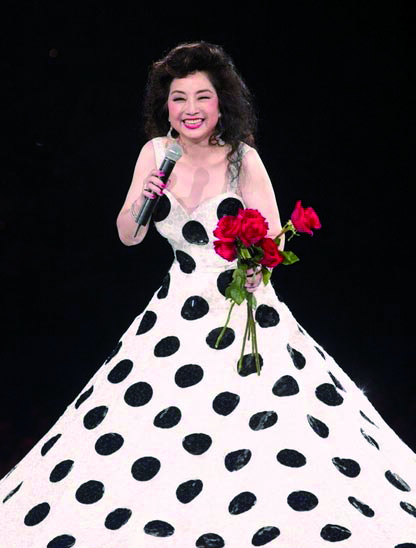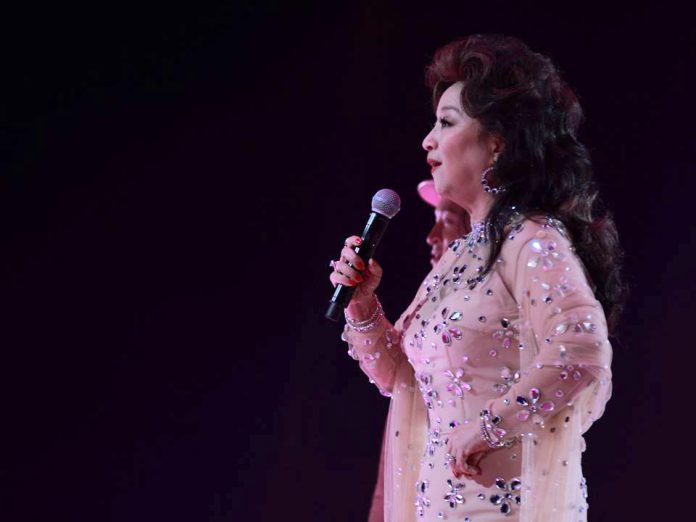Cantopop legend Paula Tsui looks back on her 40-year career
By Minnie Wong
The lobby of Hong Kong’s iconic Peninsula Hotel, with its high ceilings, gold and ivory coloured columns and grand staircase seem like a fitting setting for a conversation with the grand dame of Hong Kong Cantopop, Paula Tsui Siu-fung. Tsui is elegantly turned out in a black pantsuit, a wig, and huge vintage sunglasses – the picture of an old-school movie star attempting to go incognito.
Indeed she quickly establishes she wants to go unnoticed, telling Varsity she does not want to be photographed for the interview. At one point she worries that the tourists holding out selfie sticks may be trying to take photographs of her.
This comes as something of a surprise as Tsui should be used to the consequences of fame by now – after a career spanning more than four decades. The 67-year-old star has outlasted her contemporaries, still plays to packed houses and has even won over a new generation of fans, some for reasons she never expected. Looking back, Tsui, who is affectionately known as Siu Fung-jeh (Big Sister Siu-fung) describes her life in show business as a dream.
“It’s a very real dream, although there’s a huge chasm between the day I first started and the 40 or so years that have passed in between,” she says. “I feel grateful – there’s been a measure of luck.”
But luck cannot wholly explain Tsui’s popularity. Apart from the time and hard work she has put into perfecting her craft, Tsui says it is her persistence that has set her apart.
“I’ve had many friends who are singers, some are much better singers than me, but they gave up in the middle of the journey… It’s all about whether you have the stamina and the interest to carry on.”

Over the years, Tsui has built a solid reputation for her singing skills, her striking stage wardrobe featuring elaborate dresses with full skirts and long trains, and her easy rapport with the audience.
Today, her unique voice with its husky tones and deep register still captivates audiences. For her, singing is not just about the art of performance, it is about creating emotional resonance. Interestingly, she says she treats her songs as “patients” which she nurses to health to get the best out of them. Although she is regarded as a consummate professional, Tsui never formally studied music or singing.
She was born in Wuhan and moved to Hong Kong as an infant. The eldest child from a poor family with six children, Tsui left school at a young age to work at odd jobs to support her family. She taught herself to sing by listening and singing along to the tunes on the radio.
After drifting aimlessly between jobs, Tsui eventually found her calling in 1965 when she won a singing contest which led to her becoming a nightclub singer in 1968. Talent, luck and persistence led to her success and a recording deal with Sony Music that enabled her to release the Canto-pop albums that propelled her to stardom. “It all happened by coincidence, I never thought people would actually hire me,” she says.
Since her 1970 debut Mandarin album Autumn Night, Tsui has released more than 60 records before her last one in 1990. Her hits include classic Canto-pop tunes such as Season of the Wind, Char Siu Bao, Flowing in the Natural Direction and Behind the Bridal Gown, the theme song of a popular 1980s TVB drama series.
“To be honest, I never thought that I would stay in the industry for this long. But surprisingly, I love my job more and more as I go along,” she adds.
Tsui’s catchy pop songs from different periods may have different meanings for Hongkongers of different ages but one of her classics, in particular, has earned her a place in the hearts of today’s generation of youngsters.
A few years ago, netizens on the Golden Forum began quoting lines from her 1979 hit Hei Hei Yeung Yeung (Full of Joy) to respond to news they considered worthy of “celebration”, and to mock particular events. This developed into the shorthand “Welcome Siu-fung Jeh!” (有請小鳳姐!), usually followed by dancing emojis.
In 2012, people gathered outside the Sha Tin office of the former legislator Ray Lau Kong-wah after he lost his Legislative Council seat and sang the lyrics “Play the piano fervently; sing fervently” from Hei Hei Yeung Yeung to gloat over his loss in the polls. These scenes were repeated when two other pro-establishment lawmakers Christopher Chung Shu-kan and Wong Kwok-hing lost their seats in September this year.
This, combined with localist inspired nostalgia for things that represent Hong Kong culture have turned Tsui into a cult icon as well as an established superstar. This image was further entrenched when she made a surprise appearance at an alternative awards ceremony held by the satirical youth-oriented internet TV channel TVMost in January.
Tsui was originally unaware of the reasons behind her revival among youngsters and the internet community. When it is explained to her, she professes indifference. She guesses people use her lyrics because they are unable to quite express their emotions through words and suggests that in a way, they treat her lyrics as slogans.
Tsui’s fame is not limited to Hong Kong or even the Mainland, she is hugely popular with the overseas Chinese and has held concerts around the world, including in Las Vegas, Singapore and Malaysia. Although she has slowed down from her heyday, Tsui still performs, singing to a packed auditorium at the Hong Kong Coliseum for eight nights in August this year. It is a venue she knows well after holding a record 43 concerts there.
In the late stage of her career,Tsui feels more committed to her fans than ever and this gives her the incentive to perform better. “I only had to be responsible to my boss when I first started my career but now I have to be responsible to my fans,” she says.
After 45 years on the stage, there is not much that can faze her. Unpredictable errors can occur at any time. The most memorable incident is when the power went out in the middle of a concert.
Tsui says that mishap was unlike any other because she had no idea how she should respond.
“I was singing the song Come Rain or Shine (風雨同路) and when I got to the line ‘there is darkness on the other side of light’, the lights went out completely,” she recalls.
Tsui panicked and struggled over whether she should stay on the stage or leave it. She decided to stay put and luckily, her team followed her lead. “I just stood there with the exact same pose, so did my dancers and band,” she says. “It lasted for at least seven minutes.”
When the lights went back on, she continued as if nothing had happened, and the audience broke into thunderous applause.
Moments like this remind Tsui that it takes courage and luck to be a singer,
“It’s like racing, you have to run to the finish line no matter what happens in between,” she says. It is a race she has not given up on yet, although the look of the racetrack has changed since she first started running.
Tsui acknowledges there is more creativity in popular music today, more song genres and performance styles. She says veteran singers like herself have been adding newer elements into their songs to suit changing audience tastes. But she still prefers old traditional songs.
“I think that traditional songs give me a complete story. They have a beginning, a transition and an ending,” she says.
Tsui’s story is still unfolding. She says she has never considered herself to be popular, even though people tell her she is well-loved by the public. Instead, she is just grateful audiences have not forgotten her and thinks that worrying about popularity would only give her pressure. Icon or not, Tsui says the most important key to success is to never give up on your dreams.
This is the motto by which she has always lived herself. She says she is not sure about any forthcoming plans but has never seriously considered retiring. For the foreseeable future at least – the show will go on.
Edited by Zoe Lai











































